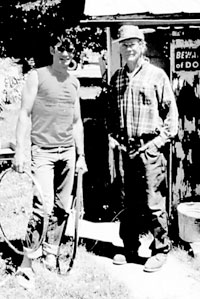|
| ||||
| The legend of Mr. Smylie SideStory: Bigger, better Bike to Work Day planned
by Missy Votel Generations of Durangoans knew him simply as “the bike man,” but thanks to a dedicated group of locals, the legend of the late Melvin “Mac” Smylie rides on. Earlier this spring, local bike mechanics Bob Gregorio and John Bailey, and Durango Cyclery owner Russell Zimmermann started the Mr. Smylie Bike Project with the goal of fixing up old bikes and donating them to those who cannot otherwise afford bikes. “He filled a role for the needy people of Durango,” said Bob Gregorio, a mechanic at the Cyclery and friend of Smylie’s, who died last December at the age of 94. “He retired and needed a hobby. He started fixing up old bikes and selling them, and he caught the bug. Pretty soon, he evolved into being the old-bike man of Durango.” The project began when the extensive stockpile of used bikes and parts from Smylie’s North Main home were donated to Gregorio. In keeping with the Smylie tradition, Gregorio and the others decided to begin to fix them up with the intent of donating them at Bike to Work Day, on Wed., June 27. Over the course of three snowy days last spring, they got together outside of work and began fixing up the bikes, which were being kept in Bailey’s garage. Word soon got out and within days, the first crop of recycled bikes had been adopted. “We’ve given away 17 bikes so far,” said Bailey, a mechanic at the Cyclery. “As soon as we got one out, more people would come in asking for one.” Most of the bikes have gone out to immigrants who use them for commuting to and from work. “I see them everywhere, riding around, and when I see them, they’re totally psyched,” said Bailey. Smylie’s two daughters, Diane Trembley and Linda Duffin, said they are glad to see their father’s legacy live on. “I think it’s great,” said Duffin, who now lives in the family home, which was sold and will change hands later this summer. She said her father would be happy to see the bikes going to good use. “He and Bob were really good friends, he was almost like a father to Bob,” she said. “Toward the end, I asked my dad what to do about all the bikes, and he said, ‘Bob Gregorio.’” Duffin said her father got into fixing up bikes for the fun of it and to stay busy. “He kind of got into it by accident. He mostly did it so he would have somebody to yak at,” she said with a laugh.
Indeed, while Smylie was alive, he was known almost as much for his colorful personality as his wide array of bicycles. “He was such a warm, wise old man,” said Gregorio, who first met Smylie in the ’70s. “He was a wonderful guy with all these stories of old Durango.” Most of Smylie’s bikes sold for $25, although that was negotiable, said Duffin. “He would ask people what it was worth to them. If someone was poor, he’d give them a bike.” By the same token, it never fazed him much when the occasional bike went missing from his yard. “Somebody would come by and steal one, and he’d say, ‘Well, I guess that one’s gone,’” she recalled. “But then, he’d go out to the alley and two more bikes would be dropped off.” It is this sort of grassroots, community involvement He said the money will be used to buy parts and locks for bikes. While bikes are now free, that could change as demand increases, with prices possibly being based on a yet-to-be determined sliding scale or on the bike’s quality. However, Bailey notes no one will be refused a bike. “If they want one, we’ll give it to them,” he said. Ultimately, any money made from selling the bikes would be put back into the project’s account. Even further down the road, the three envision a Durango Bike Co-Op, which would serve as a central hub for bicycle clinics and recycled bikes as well as bicycle advocacy. “It would be sort of a bicycle community center,” said Bailey. “Cities everywhere are doing recycled bikes, and for being such a cycling community, we really should be doing something as well.” In the meantime, the three are working on building momentum around the Mr. Smylie project, hoping it will help pave the way for more community interest in bicycling, not just as a form of recreation but as a lifestyle. And in so doing, they hope to take the notion of helping those in need one step further by alleviating some more far-reaching problems. “Of course, I can’t speak for Mr. Smylie, but the way I see it, bicycling is a solution for some of the social issues that are front page news, like global warming, the health crisis and the oil crisis,” said Gregorio. “Because we believe so much in cycling, it just feels like the right thing to save what would go to the landfill and re-use it.” To that end, the three said anyone wishing to donate used bikes can drop them off at the Durango Cyclery. And who knows? Maybe that old hunk of junk rusting in the garage could actually have a few miles left in it after all. “All those bikes buried in the ground or in garages could change people’s lives, not just physically, but mentally,” said Bailey. “People on bikes are happy people. There’s no road rage – they’re just riding.”
|
In this week's issue...
- January 25, 2024
- Bagging it
State plastic bag ban is in full effect, but enforcement varies
- January 26, 2024
- Paper chase
The Sneer is back – and no we’re not talking about Billy Idol’s comeback tour.
- January 11, 2024
- High and dry
New state climate report projects continued warming, declining streamflows



